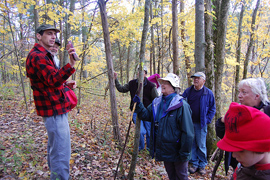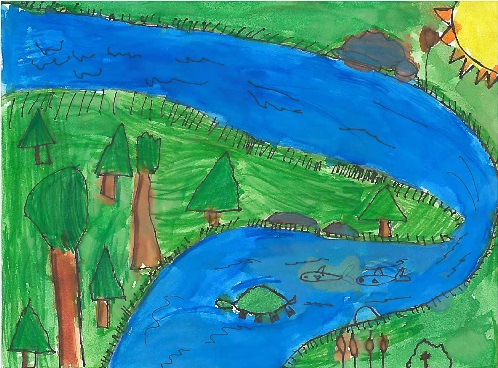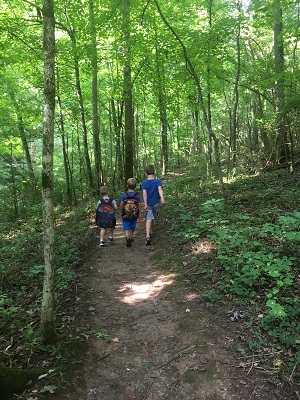Helping Kentuckians and visitors alike experience the Commonwealth's wildest places is very important to KNP and many of our partners. Recent studies show that the more time kids (and adults) spend outside and unplugged, the healthier, calmer, and better-adjusted they tend to be. There are also no better classrooms than KNP natural areas and nature preserves—from biology, to geology, to history, to art, to literature, KNP areas can provide unique hands-on education in settings found nowhere else.
Please note that permits are required for scientific research on any KNP natural area, nature preserve or wild river, or on group outings of more than 10 people. For more information or an application, please contact naturepreserves@ky.gov.
Environmental Education and Research

Kentucky’s state nature preserve system offers a wealth of opportunities for research and
education. A comprehensive sampling of the state’s natural community types are represented and many contain the best remaining examples of a rare community or species known in the state. The preserves can be considered living museums, presenting a window to the landscapes of Kentucky’s past.
Research topics are as diverse as the preserves themselves and can include investigating specific questions that have arisen as preserve management issues, inventorying plants and animals, population studies, cave mapping, studying water quality and quantity or conducting forest health assessments. There are many benefits to conducting research on a state nature preserve. The dedication law that protects the preserves in perpetuity makes them more attractive to researchers seeking a stable site for long-term study. Natural Areas management staff is available to provide some assistance with project logistics. Contact KNP for more information.
 Educational opportunities are available on KNP natural areas with hiking trails. Teachers and professors are encouraged to take advantage of these “outdoor classrooms” for instructional use - with a little imagination, subjects such as art, music, math and social studies as well as biology can be enhanced in a natural setting. The Kentucky Environmental Education Council and the Kentucky Environmental Education Association are great places to find examples and sources of materials for use on-site. KNP biologists and natural areas managers are also available to visit classrooms and other sites to talk about our work.
Educational opportunities are available on KNP natural areas with hiking trails. Teachers and professors are encouraged to take advantage of these “outdoor classrooms” for instructional use - with a little imagination, subjects such as art, music, math and social studies as well as biology can be enhanced in a natural setting. The Kentucky Environmental Education Council and the Kentucky Environmental Education Association are great places to find examples and sources of materials for use on-site. KNP biologists and natural areas managers are also available to visit classrooms and other sites to talk about our work.
Each year, a series of guided hikes is led by KNP biologists. Programming for children and adults is also offered by partners, particularly on our Heritage Lands. A list of hikes and events is available via our events calendar. KNP biologists have also led many environmental education programs for partners:
- Louisville Zoo Party for the Plant Earth Day Celebrations
- Aquatic Biodiversity Workshop at Floracliff Nature Sanctuary, Fayette County
- University of Kentucky Natural Resources and Environmental Sciences course
- Quiet Trails State Nature Preserve Aquatics field day, Harrison County
- Moth Night at Floracliff Nature Sanctuary, Fayette County
- Woods and Water Land Trust Aquatics field day, Franklin County
- Native Plant Hikes with the Kentucky Native Plant Society:
- William H. Martin State Natural Area, Pulaski County
- Cove Springs Park, Franklin County
- E. Lucy Braun State Nature Preserve, Harlan County
- Thompson Creek Glades State Nature Preserve, Larue County
- Cumberland Falls State Park Nature Preserve, Whitley County
- Lower Howard's Creek Nature and Heritage Preserve, Clark County
- Tom Barnes Memorial Hike at Red River Gorge, Powell County
- Kentucky Natural Land Trust Wildlands Social Club, Lexington
- Kentucky Native Plant Society Botanical Symposium, Boone County
Here are links to a few of our environmental education partners:

Nature-based Recreation
The KNP State Nature Preserves, State Natural Areas, and Heritage Lands showcase excellent examples of Kentucky's biodiversity.
The primary function of a nature preserve is to protect rare biological resources and natural communities. For this reason, only passive recreational activities such as hiking, photography, bird watching and nature study are appropriate. The majority of the preserves are open year-round from sunrise to sunset. Trails are open to foot traffic only, and visitors must stay on them at all times. In order to protect the natural and cultural resources occurring on state nature preserves, motorized vehicles, horseback riding, bike riding, artifact gathering, plant gathering, hunting, climbing, rappelling, camping, picnicking, building fires, audio equipment and pets are not permitted.
The primary function of a natural area is to restore native species and natural communities, and to provide wilderness experiences. Natural areas have generally similar rules as nature preserves, except some also permit fishing and hunting under current Kentucky Department of Fish and Wildlife Resources regulations, as well as paddling opportunities.
Heritage Land uses are much broader and range from nature preserves to wildlife management areas to county parks to environmental education centers.
Check out our
Locations link for info on specific hiking trails and paddling spots near you!